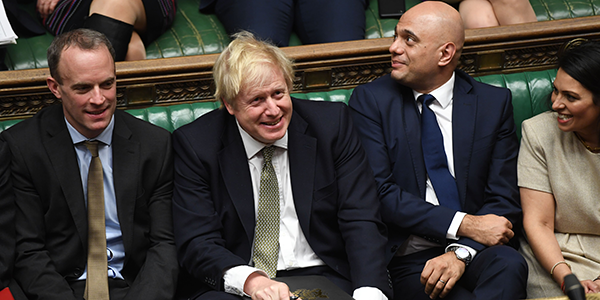A great or Pyrrhic victory? The dangers ahead for Boris Johnson
This year Prime Minister Boris Johnson must negotiate the details of the UK’s future relationship with the EU. Although he has the benefit of a sizeable Commons majority, there are potential pitfalls for him, explains Ben Worthy, in the complexity of these negotiations, party management and in Johnson’s own leadership style.

Picture: UK Parliament/Jessica Taylor/(CC BY-NC 2.0) licence
In the afterglow of his election victory, Boris Johnson appears to have beaten the curse of the takeover leader. Most prime ministers who ‘takeover’ from another do badly. They don’t often win elections and don’t often fare too well – think Alec Douglas-Home, James Callaghan or Gordon Brown, an unhappy band of brothers who all took over as leader and promptly lost.
Johnson now joins a slightly happier, and smaller, group who took over and then won a subsequent general election. Anthony Eden, Harold Macmillan and John Major all stepped into Downing Street and went on to election victory in 1955, 1959 and 1992 respectively. Technically, you should include Theresa May as an honorary member in this ‘takeover winner’ list, though I think we are all agreed she managed to somehow lose while technically winning – or at least didn’t win enough.
How Johnson overcame the curse seems clear. In fact, it is so clear that Tony Blair warned Corbyn about it in September 2019, three months before the election. A pre-Brexit general election, said Blair, was an elephant trap for Labour. Johnson, Blair predicted, would mix Brexit and Corbyn as an issue then use it as a battering ram against the Labour Party. The Brexit Party was a chimera, and would fade away, while the seemingly irresistible Remain vote would split, broken apart against the immovable barrier of the first-past-the-post electoral system.
An even more cynical way of interpreting Johnson’s victory is that it wasn’t Johnson’s victory at all, but Theresa May’s. It was May’s deal, with the complex backstop cut out, and May’s election strategy, involving breaching the fragile/non-existent red wall. Not for the first time in history, a man stole the ideas of a girly swot in broad daylight and passed them off as his own. Whether this was a case of ‘polish, plagiarism or plain theft’ is up to you.
Yet as Johnson surveys his new majority, his classical education should warn him of the threat of a Pyrrhic victory. For those ‘winning takeovers’ who came before, the problem was that winning an election was their major achievement. Anthony Eden, of course, didn’t have time to do much except start a silly war. Macmillan and Major both found their ambitions wrecked by Europe. John Major and Europe requires zero explanation. Macmillan’s failure to join the EEC wrecked his ambitious plans, when De Gaulle very unreasonably predicted the British would join, be difficult, make a mess, then leave in a huff.
In some ways, Johnson resembles Macmillan in his sunny optimism, and in his entirely fabricated political character (even his ‘pose as a poseur was a pose’, complained Harold Wilson of Macmillan). This comparison can only be taken so far. Macmillan once ran back into a burning plane he’d just crashed in, to rescue a wounded French officer. Johnson hid from a GMTV journalist in a walk-in fridge.
For Johnson, the danger comes from three separate directions: Brexit, party and Johnson himself. The first danger is, of course, Brexit. Brexit is a mincing machine for British politics, which has taken out two prime ministers since 2016. It has also destroyed or undermined several parties. UKIP and the Brexit Party are nearly gone, the DUP seem lost and the Lib Dems didn’t do any game-changing. It is the UK’s new Home Rule. This is in part because Brexit is so hideously complicated and in part because the domestic and international are deeply connected. Every decision threatens to break something. A hard Brexit could easily lead to IndyRef 2 for Scotland (and even a border poll for Northern Ireland). A soft one could well split the Conservative Party, and even sweep away Johnson. Does he want to be the Prime Minister who broke up Britain or betrayed Brexit?
This is why all the supposed radical ‘Gordian knot’ solutions failed. Remember how triggering Article 50 early would force the pace? Calling a snap general election in 2017 would sort it? Brexit is a process, and not an event. It can’t be solved by a single shock decision. Johnson’s win has certainly given him a majority to do something, but it hasn’t solved the fundamental question, as Tony Connelly put it, of whether Britain’s future lies with the US or Europe, or how to square the most impossible task of bringing together a dis-united kingdom with a hard Brexit.
A second danger is his party. Parties make and break a leader, as his predecessor found out. Recent prime ministers have found parties to be very ungrateful with very short memories for winners. Here’s 1992 winner John Major:
We had an overall majority of twenty-one. In the afterglow of victory it looked like plenty, but that was to prove a mistaken judgement. In the years ahead it would seem cursedly small, as it was slowly sliced away through by-election defeats and defections. With more seats, I would have had the ability to act with force against those in the party who chose to rebel.
Rebellion among governing party MPs has been growing over decades, so much so that Anthony King called Britain an ‘over the shoulder democracy’, where a Prime Minister must look constantly behind themselves for security.
Johnson’s effective majority of 87 is more than three times Major’s. However, a large majority can even encourage rebels, and Brown struggled even with a majority of 66. Normally rebellion isn’t dangerous but Johnson must rapidly steer through a lot of very divisive and complex legislation with a new and unpredictable party, where a third of MPs are new and some may want to send signals to their constituency.
Finally, a third danger is Johnson himself. His election victory may be personally Pyrrhic in having exposed his weaknesses. Johnson has certain traits that don’t bode well. He doesn’t seem very engaged in the detail, and right now the detail matters. Nazanin Zaghari-Ratcliffe is still in jail. His career in London is littered with mistakes and problems from poor ‘shut the back door’ buses to non-built bridges. His biggest achievement, his Brexit ‘deal’, has some dubious foundations. Ken Clarke’s view on the negotiations was that Johnson was
…desperate for a deal. He’d go for anything. That’s why in the end there was no proper negotiating… It was quite obvious from what Johnson said afterwards that he hadn’t understood what he was agreeing to. He had not recognised it as the original EU proposal. He still refuses to accept that he signed up to a customs union down the Irish Sea.
Of course, this could be sour grapes but Johnson’s unreal comments on what the deal means support the view he is worryingly clueless, or pretending to be.
Then there’s Johnson’s fear of scrutiny. Theresa May, nicknamed the submarine by David Cameron for her secretive habits, looks like a lighthouse in comparison. As well as his fridge malingering, Johnson has hidden from parliamentary questions, and ducked the Liaison Committee. He was notable for his absence in the Iran crisis and his seeming commitment to conduct Brexit from behind a locked door may be storing up trouble.
Separately, these are all serious difficulties. Together, you can see how a political doom loop begins. Imagine a Brexit-induced back down or fudge, triggering upset among backbenchers, followed by Johnson promptly going to ground, worsening the situation. All things must pass, but Johnson’s honeymoon may well pass quicker than expected. Despite his victory, he must handle his next steps with care, something he has never done is his career up until now.
This post represents the views of the author and not those of Democratic Audit.
Ben Worthy, (2016) ‘Ending in Failure? The Performance of ‘Takeover’ Prime Ministers 1916–2016’ is available here.
About the author

Ben Worthy is Senior Lecturer in Politics at Birkbeck College, University of London. He is the author of The Politics of Freedom of Information: How and why governments pass laws that threaten their power.





 Democratic Audit's core funding is provided by the Joseph Rowntree Charitable Trust. Additional funding is provided by the London School of Economics.
Democratic Audit's core funding is provided by the Joseph Rowntree Charitable Trust. Additional funding is provided by the London School of Economics.